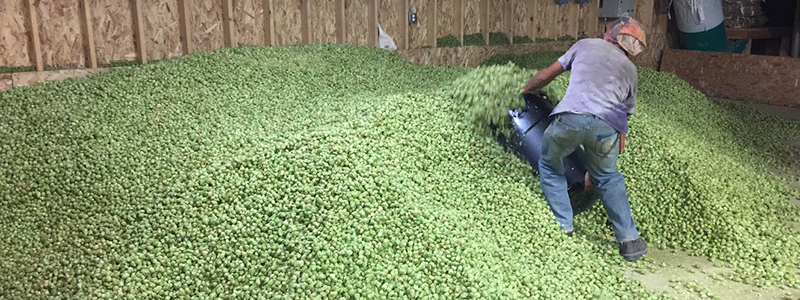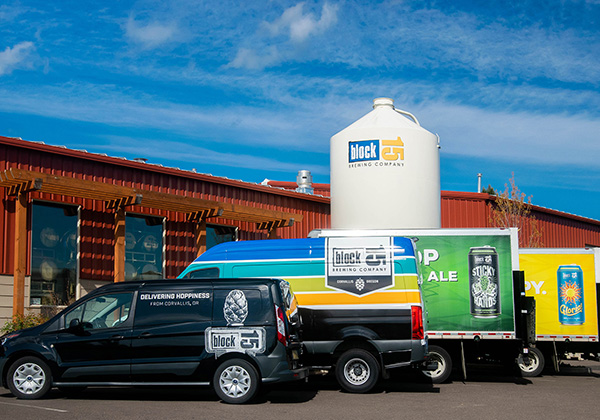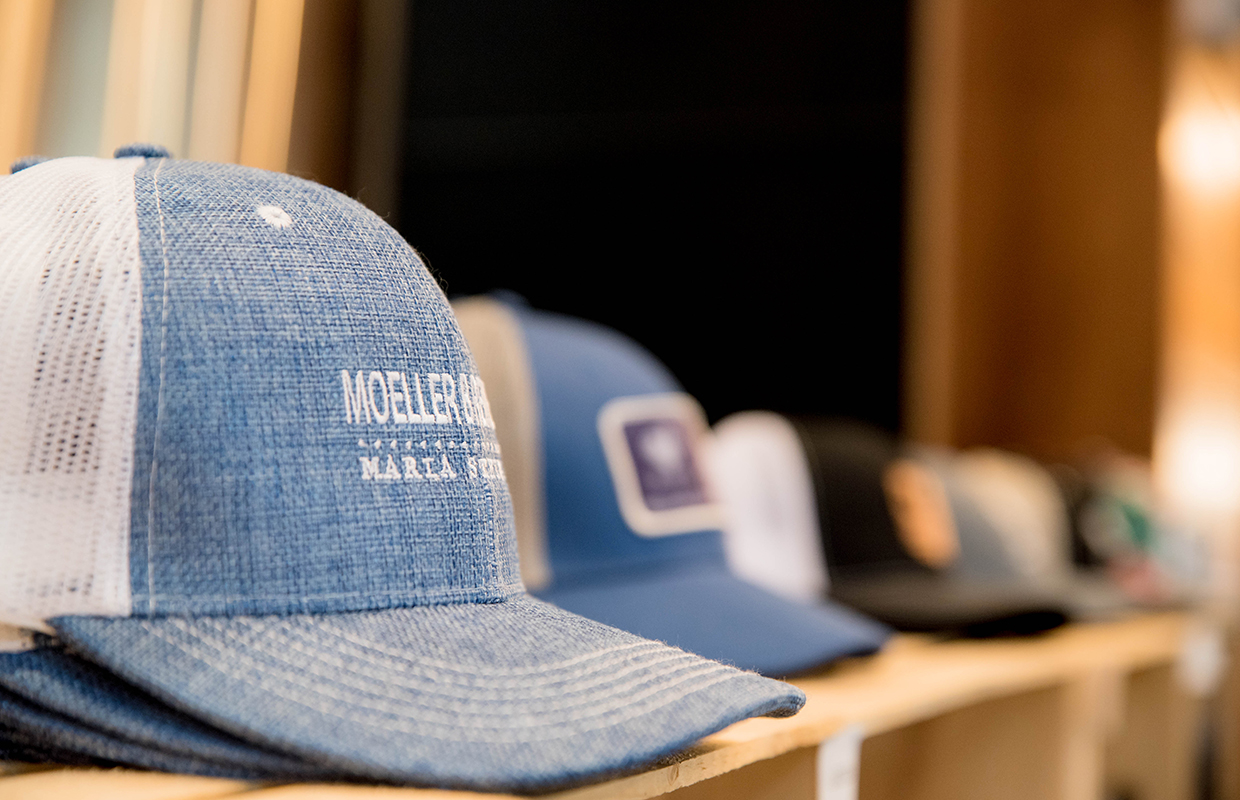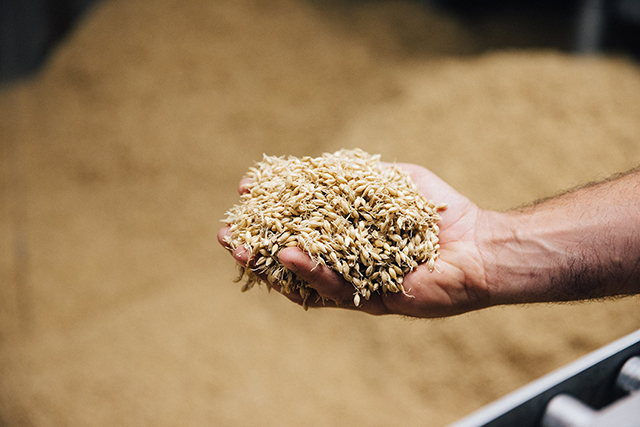
Hops are a life blood to a brewery. Not having the proper amount in stock can cause problems in production, but finding the right balance between having the supply, predicting a demand and formulating recipes can be tricky. Many breweries that plan to brew larger volumes come out of the gate by signing contracts to endure a front-end risk financially, but it can help a brewery sustain for the future.
“Contracts are so important because they ensure that you at least have some of what you need if not all of it,” explained Cris Ellenbecker, the Brewmaster for YeeHaw Brewing. “When you spot buy hops, especially hot varieties, there’s no guarantee that they will be available.
“Plus, when you contract you can get a much better price per pound compared to what you will find just spot buying.”
Contracts are very important for any production brewery added Rhinegeist’s Cole Hackbarth.
“It maintains quality and consistency in your supply which directly translates to quality and consistency in the finished beer,” he said. “Aside from that it’s a great way to start building relationships with brokers and growers.”
Hackbarth pointed out that when the brewery ran short on hops, the good relationships they had in the hop industry made it possible to find what they needed.
“Looking forward, those contracts and relationships are giving us access to new and hard to find varieties that may not hit the spot market,” he said.
Dean Roberts, Knee Deep’s Brewmaster narrowed down contracting to quality, consistency, and cost.
“You want to be able to have a consistent product. When contracting you are able to select your contracted hop varieties and get your contract from one lot most of the time or blend multiple lots of your choosing,” he said. “Then you can produce a consistent product all year and year to year.”
Hop contracts have proven to be a major pain said Red Hare head brewer Bobby Thomas.
“You have to have them if you want to guarantee that you’ll have the hops you plan on needing for that brew year but if you don’t use them all, you have to either buy them out or pay major fees,” he said. “Also, what if your brew plans change and you don’t need a particular hop anymore?”
That has happened for Great Divide. It’s not hop shortages that have impacted their production goals.
“We have the almost the reverse challenge of sitting on long contracts on certain varietals that were primarily used in one brand that has now been discontinued,” explained Brewing Manager Brandon Jacobs. “Since the varietals that we have are not the ones that consumers are excited about currently, it is hard to offload them to other breweries or secondary vendors without taking a percentage of a loss from the original price.
“We have had to employ a multi-point strategy to limit our exposure with these contracts and the resulting storage fees that accrue, which includes; working with our vendors to shift contracts to other varietals when possible, accepting a small percentage loss to sell to a secondary vendor, and design new beers that artfully incorporate those varietals while still meeting consumer demand.”
Thomas added that it used to be said for breweries to think of hop contracts with a 80/50/25 plan: Contract 80 percent of what you think you need for next year, 50 percent for the following year, and 25 percent for the year after that.
“Now I believe it’s more like 50 percent of what you’ll need next year and just wait to see what happens after that,” he said. “There has definitely been a surge in hop production but some hops are still hard to get.”
That means adjusting some brew schedules. For Rhinegeist a lack quantities for Southern Hemisphere hops like Galaxy and Nelson Sauvin because of its popularity means beers like their Andromeda, which uses Galaxy only, gets into the seasonal rotation when they can get the hop. A beer called Fiction which used all New Zealand hops has had to be scrapped due to scarcity of the varieties.
Jacobs credits some of these shortages, like to Galaxy and Citra because of the surging Hazy IPA market by consumers.
“Limited supply and huge demand will do that,” Roberts said.
Ellenbecker said there are some pretty standard contracts, especially if a brewery is rolling contracts over with the same company.
“It is all dependent on the variety of hops that you are trying to contract too,” he said. “It’s all about getting the best deal all around. If you are getting great prices for a specific variety from one farm, try to get a couple years worth of contracts with them, because that same price for that hop might not be there the next year through someone else, or the price could jump if you weren’t already locked in at that price.
“I’ll contract extra whenever I can, and resell them later if I have too much. Sometimes you can even find a vendor willing to buy back certain varieties.”
Each broker will start with a contract based on what a brewery is asking for. It could be for a single variety or many, for one year or several. Hackbarth said terms depend on the volume a brewery is contracting and for how many years.
“It is also important to remember hop contracts are set on crop year, which is different from brew year,” he noted. “The brokers have finance and storage fees that start incurring as they are getting ready to harvest the next crop in the summer. So you will want to keep that in mind when planning your orders.
“Also it can take several months to process some varieties after harvest. So having extra volume to get you through is important.”
Rhinegeist currently has 26 varieties contracted across six brokers up to four years out.
“It can quickly become overwhelming but regular check-ins and adjustments on those contracts make the process easier on both sides,” Hackbarth said.
Jacobs said he thinks hop vendors are best viewed as partners in craft brewing.
“As you build a business relationship with them it is more of an ongoing conversation about what your needs might be and how they might assist you in reaching your goals,” he said. “It is important to be direct when it comes to the strictly business parts of that relationship but hop farmers, brokers, and vendors are on the whole really great people that are fun to get to know and have a beer with.”
When Knee Deep started planning an expansion and needed to secure hops for a production-type brewing schedule, they wanted to make sure we would be able brew the “core” beers they had developed on a consistent basis.
“We were also told to secure as many contracts as we could by multiple brokers because there could be another shortage coming and if we were a little over-contracted there would be no problem getting rid of excess,” Roberts explained. “Not the case. Seems like there are plenty of hops available without a contract now and [it’s] difficult to get rid of your excess unless you somehow have extra New Zealand and Australian hops, or some of the newer American varieties.
“If you have multiple contracts, especially large contracts and buying power, you can have an easier time getting what you need at decent prices. For the rest of us it’s difficult.”
Jon Cross, the co-owner and head brewer for Call to Arms Brewing would suggest using the spot hop market until a brewery has its needs dialed in.
“Nothing is worse than sitting on a surplus and trying to offload last year’s hops to someone else,” he said. “We had a couple beers that used Nelson Sauvin and now it’s just not an option. Currently, it’s trading at $30-plus a pound. That’s just not a purchasable price for people of our scale.”
Ron Abbott, the co-owner for Seedstock Brewery recommends smaller breweries to go to the secondary hop market, such as the Lupulin Exchange.
Dennis Arnold, the founder and Brewmaster at Barrio Brewing just redid their hop contracts with YCH.
“I was one of the breweries that got screwed back in 2008 by “force Majeure” and ended up with no hops but got some help from Sam Adams who held a lottery for small brewers to win the right to some of their contracts,” Arnold said. “[I] won’t let that happen again so we built a hop freezer which keeps us a year ahead of needs. [You] must keep them frozen as a cold box just won’t cut it.”
The original contract signed with YCH in 2016 was a four-year commitment of around $600,000. Arnold was allowed wiggle room this year to move some hops around and also try new ones. The Barrio contracts largely consisted of gold standards like Citra and Mosaic along with the brewery’s heavy lifter, Czech Saaz.
“My sense is hop suppliers are nervous about people not holding their end of the contract,” Arnold said. “I assured them I would spend the same amount of money but possibly in different products including variety and form going forward into 2020.”
Barrio eliminated a front-line canned beer due to the hop cost going up with no end in sight. “Blanco IPA was an expensive beer to begin with from the malt side,” Arnold said. “It was also a single-source hop meaning one farm. We faced quite a bit of push back and took a hit in the market but 18 months later all is well.”
Arnold admits they are probably over contracted.
“But thinking back that for several years where our supplier only delivered on 80 percent of our contracts, it’s worth the spend,” Arnold said. “In effect we built the probability of shortages into our contracts and sit on frozen hops like money in the bank.”
Arnold pointed out that smaller breweries need to make a relationship with their supplier.
“Small brewers’ needs are better met by brewing supply houses that amalgamates such things,” he said. “The system works well that way as opposed to trying to hold tiny contracts with the growers. There are only so many hop reps to service 6,000 breweries.”
Hackbarth noted for breweries to remember they are all part of the same industry and working towards the same goal.
“The better craft beer gets the more of it will be sold and thus more hops need to be grown,” he said. “Everyone wins from brewers to brokers to growers when the brewing industry as a whole does well.
“Farmers don’t just grow hops to make money. They could plant other crops and make more money. They plant hops because they love beer as much as brewers. Communication is key, talk to your brokers, have conversations about how close you are to your forecast and contracted volumes. Make sure you are forecasting raw materials, this will help in every aspect of your business, not just hop contracting.”
Roberts said he doesn’t know what the hop market is going to be like in the distant future but he doesn’t think newer, small breweries need to contract.
“They should be able to find what they need out there without a problem,” he stated. “They will definitely have to overpay for some Nelson or Galaxy, but most of us are.
“If you have a beer that you know you will always make and want to dial in the consistency on it (especially IPAs) then definitely pursue a contract. Or if there’s a hop that you know you will always use in beers you produce now and beers you will develop in the future then contract it.”
Photos courtesy Hire Wire Hops & Maxline Brewing






2 Trackbacks / Pingbacks